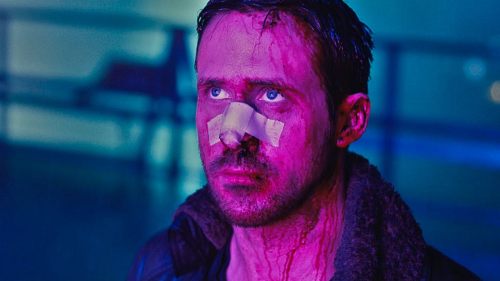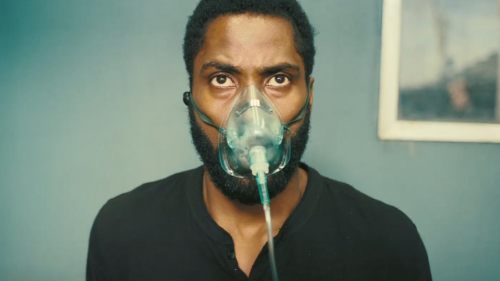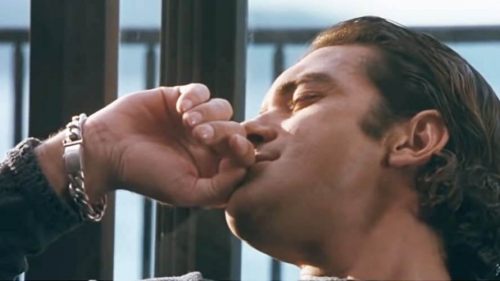Movie Review: GANGSTER SQUAD Is Cartoonish Fun
Do not expect much from Gangster Squad. This is not LA Confidential 2. This is not LA Noire: The Movie. This is not a hard-hitting film. This is not a movie with much to say. Gangster Squad is a big cartoon, a pulpy movie made by people who only know pulp from reading about it in movie reviews. It’s the grim n’ gritty version of Dick Tracy. And if you approach it like that, you’ll enjoy the movie just fine.
Gangster Squad is set against a reality-esque backdrop of 1949 Los Angeles. Mickey Cohen is a rising force in the local criminal underworld, forcibly cutting off the West Coast from the Italian mobs of the East Coast and Chicago. He’s a maniac, the embodiment of indiscriminate progress (as the script literally tells us a couple of times), the dark side of post-WWII America. He owns the local justice system and the police, and he operates with impunity.
But one LAPD chief fights back, and he creates a secret, extra-legal unit dedicated to smashing Cohen’s operations. Led by WWII hero Sgt. JohnO’Mara this ragtag group includes an almost morally-tainted cop, a black cop, a Mexican cop, an old cop who dresses like he’s in Tombstone and a nerdy cop. They have modest success against Cohen until they come to a big montage where things really start working in their favor. Then it gets pretty dark and sad but they rally and win in the end, distorting history completely in the process.
Josh Brolin is O’Mara, and he’s the kind of chiseled dad figure of masculinity you need in a film like this. His character trait is that while he loves his wife, he is too straightforward about honor and duty. His pal on the team is Ryan Gosling, playing a scoundrel with a heart of gold. We know he’s a scoundrel because he drinks a lot and we hear about him sleeping with women. We know he has a heart of gold because he immediately falls in love with the only woman he fucks in the movie, Emma Stone (but who wouldn’t). Oh, and because he has a soft spot for a shoeshine boy/informant (a character type too long missing from our cinema screens, if you ask me. The last one I can think of is in the Naked Gun movies).
These two work, pardon the pun, like gangbusters. It’s exactly the right energy, with Brolin being very stiff and very physical - a real Joe Friday with brass knuckles - while Gosling is louche and charming. This isn’t James Ellroy, so his character’s peccadilloes are pretty tame, making him a kind of a Han Solo figure. Everybody pays lip service to what a rogue he is, but he’s a good guy who just hangs out in seedy places.
The film’s center of ridiculous gravity is Sean Penn, buried under a big fake nose and giving a performance so over the top he’s looking down at Felix Baumgartner. Penn throws himself into the film with wild abandon, leaving no scene unmolested. It’s not a good performance, but it’s a fun one, one that is filled with energy and life and the right kind of moustache-twirling evil to keep the story moving. But the movie's real value comes from Stone, playing a femme not-so-fatale with beauty and grace that recalls the best of the Hollywood starlets of the 40s. She radiates starpower in every moment, and manages to imbue her under-written character with a degree of humanity that the script only brushes up against. Stone is immensely watchable, utterly likable and the source of all the movie's heat.
The script, by Will Beall, is filled with delightfully corny and zippy lines, but structurally it’s wobbly. It’s hard to tell if stuff was cut - there are some scenes where Gosling’s boozer is drinking orange soda at a bar, making me think there’s an excised plot where he tries to clean up - but Gangster Squad is kept from true cartoon team nirvana by not giving the other characters enough to do. Robert Patrick plays the old gunslinger on the team, and while a big deal is made out of his six shooter and his incredible accuracy, he never quite gets a money moment. The same goes for Anthony Mackie, as The Black Guy. He’s introduced throwing a knife through a drug pusher’s hand, but he never quite gets his hero shot in a satisfactory way. Giovanni Ribisi’s nerd has plenty to do, but Michael Pena is criminally wasted. Maybe there’s a better script that has each of these guys getting their own missions and their own super moments, but it wasn’t used to make this version of the movie.
Ruben Fleischer directs with style - all of the style he can get his hands on. Speed ramping, super slomo, non-linear chronology within segments, freeze frames, tracking shots - anything he can throw at the screen to show he’s directing this movie is thrown at it. There’s no rhyme or reason to the use of the gimmicks, they’re just there to be there. For example: the movie opens with Mickey Cohen sparring with a heavy bag, and it’s speed ramped to death. The next time speed ramping comes in, Cohen is shooting a machine gun in a hotel lobby... in a scene right before he boxes O’Mara for ultimate superiority. Why didn’t the final fight have speed ramping to echo the sparring speed ramping? That might have lent some coherence to the gimmick, but Fleischer sees no need to go there. He's just throwing shit at the screen and seeing what sticks.
Most of the gimmick-heavy directing is fine, and Fleischer can work with actors. But he (or his second unit folks) have no sense for action; there’s a car chase involving grenades that happens in a wide open field and I still couldn’t tell what was happening half the time. The action is further undercut by some absolutely dismal digital photography; while some scenes are gorgeous and textured, many of the outdoor nighttime shots are horrorshows of flat, ugly digital picture. The final fist fight is absolutely ruined by the digital look. Cinematographer Dion Beebe has been shooting digital for some time now, so I have to assume the harsh, ugly video look was on purpose. It sucks, unfortunately.
Again, Fleischer is best at working with actors. The film has a couple of different tones going at once - while it’s pretty broad and colorful and comic book-y, it also has lots of ‘serious’ moments - but it’s the fact that Gosling’s low key performance and Penn’s super-sytlized performance can stand side by side that’s a testament to what works in the film. This isn’t a great movie - it’s just barely scratching at being a good one - but Fleischer’s tent is big and it allows him to play a lot of dumb stuff nicely straight-faced.
It also allows him to whitewash the whole era. This team has a black guy and a Mexican, and pretty much nobody cares. There's no sense of the era's inherent racism, and having O'Mara just invite everybody over to his house feels kind of phony; while I'm not saying the character needed to be a hard-nosed hatemonger, he's displaying 2013 mores in 1949. But this is the sort of movie Gangster Squad is - it's playing dress up in the clothes of the 40s and relishing the set design and the guns and the sleek cool of the period while not really, truly getting into what it means. It's the cartoon version of James Ellroy's LA.
Gangster Squad is fun. It’s fluffy. It’s got much more in common with the programmers of 1949 than our modern prestige-oriented retro gangster pictures. This is a movie that’s a throwback to a time when crime films were disreputable and lowbrow and were clever in language and stupid in plot. It’s got a pre-Godfather feel to it, and I found that enjoyable enough.
A side note for the gamers out there: there’s something vertiginous about the way LA Noire players will approach this movie. The reaction I had to some locations in the film that are also in the game (interiors of places that no longer exist) is exactly the same reaction I have when I recognize a location in a movie that I’ve visited. Somewhere in my brain I’ve internalized the locations of LA Noire in such a way that it’s as if I was there, and revisiting them in Gangster Squad is weird and cool, like seeing your house on screen.



